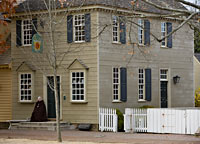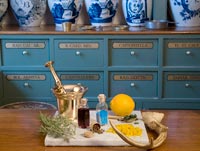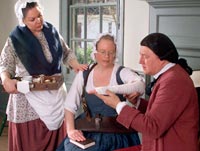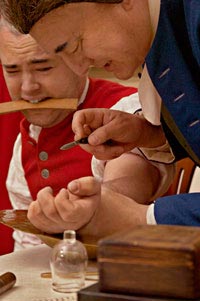Page content
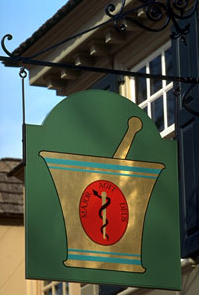
The mortar and pestle sign hanging in front of the Pasteur & Galt Apothecary Shop indicates the nature of the business within.
Apothecary
More than a druggist
In colonial times, the apothecary was more than simply a druggist. An apothecary often:
- Provided medical treatment
- Prescribed medicine
- Trained apprentices
- Performed surgery
- Served as man-midwives
Apothecary practiced as doctor
A colonial apothecary practiced as doctor. Records kept by 18th-century Williamsburg's apothecaries show that they made house calls to treat patients, made and prescribed medicines, and trained apprentices. Some apothecaries were also trained as surgeons and man-midwives.
The Pasteur & Galt Apothecary Shop on Duke of Gloucester Street is the site where two apothecary-surgeons practiced. The shop features copies of Dr. Galt's certificates in medical theory, midwifery, and surgery, for training completed at Saint Thomas's Hospital in London. A large collection of British delft drug jars for storing medications line one wall, and antique implements for compounding and dispensing drugs are also displayed, with some items original to the site. Medications made from recipes in 18th-century professional pharmacy books are also shown.
Some modern treatments based upon old remedies
Some of the ingredients that were used in colonial remedies are the basis for modern medications. They included chalk for heartburn, calamine for skin irritations, and cinchona bark for fevers. Later it was discovered that cinchona bark contains quinine for malaria and quinidine for cardiac conditions.
Expensive treatment led people to self-diagnose and treat
Medical treatment was expensive and individuals frequently diagnosed their own problems and compounded medications guided by tradition, folklore, or domestic medical books. Headaches were often treated by vinegar of roses, a remedy made of rose petals steeped in vinegar and applied topically.
Williamsburg apothecaries also sold cooking spices, candles, salad oil, anchovies, toothbrushes, and tobacco, making them true precursors of today's drugstores.
Learn more:
- "Physick: The Professional Practice of Medicine in Williamsburg, Virginia, 1740–1775," researched and written by the apothecaries.

